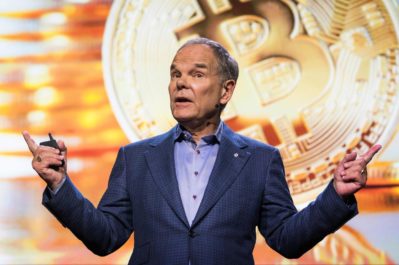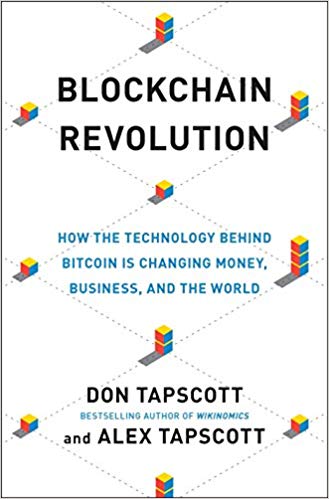With the recent public buzz about cryptocurrencies, blockchain is increasingly becoming a household term. In this episode of Mastering Innovation on Sirius XM Channel 132, Business Radio Powered by The Wharton School, Don Tapscott, Founder of the Blockchain Research Institute and co-author of Blockchain Revolution discusses the implications of blockchain, the promises of decentralized networks, and how the world will change as it embraces this technology.
Nearly a year after the dramatic fluctuation of Bitcoin launched it into the public consciousness, companies across multiple disciplines are investing resources into blockchain technology to better understand how it may soon disrupt their industries. In 2017, Tapscott launched the Blockchain Research Institute (BRI) in an effort to bring clarity to the convoluted landscape of blockchain. Currently, BRI is involved in over 80 projects investigating the use cases, strategies, challenges, and transformations that this new technology will offer.
An excerpt of the interview is transcribed below. Listen to more episodes here.
Transcript

Saikat Chaudhuri: Tell us about what the Blockchain Research Institute does, what its goals are, and what the role is that it plays.
Don Tapscott: Well, I’ve been studying technology, the digital revolution, since the 1970s. I wrote a couple of books in the 1980s that nobody read. Then I finally wrote a bestseller, Paradigm Shift, in ’92 and created a think-tank based on that. We do large syndicated research projects and have done about a dozen of them over the year. Our most recent research project is the Blockchain Research Institute. We have 80 projects underway that are looking at the strategic impact of this new technology.
As you and some of the listeners may know, Blockchain is a big deal. It’s the foundational technology for the next few decades. Just like we’ve had an internet of information for 40 years, now we’re getting an internet of value, from money to stocks to intellectual property or identities. Carbon credits, music, boats, you name it, can be managed, stored, and transacted, peer to peer. Trust is not achieved by an intermediary; it’s achieved by cryptography and some clever code.
Having said that, there’s a big opportunity, but there’s a lot of confusion. What’s a company supposed to do? What are the best use cases? How do you embrace this technology? How do you overcome the big challenges? We have 80 leading thinkers that we’ve contracted with who are running these 80 projects, looking at a dozen different industries or looking at how blockchain changes the way you manage a company in the C suite. I just spent the afternoon with a bunch of CFOs, for example, and wow, what does triple entry accounting mean for them? Double entry accounting has been the norm for 400 years, and that’s about to change. These are the big complex issues where there’s a lot of confusion. Our goal is to bring clarity. In doing so, our overall mission is to help realize the new promise of the digital economy.
“Everything the banks and related companies do, in theory, could be replaced by a set of distributed applications, smart contracts, and autonomous agents.” – Don Tapscott
Chaudhuri: Sounds very exciting. I am personally interested in this: the Mack Institute has released a white paper on the strategic and organizational aspects of preparing for and managing blockchain in a company. Now I really want to get your views. You’ve given us the layout of this technology’s promise. Give us a concrete example of how this technology (which I understand as a distributed ledger, if you want to simplify it) will transform a particular sector, similar to the examples that you were talking about — banking and other transactions and so forth.

Tapscott: Take a sector. If you want to talk about banking, that’s a good one, but there are another dozen that we’re looking at. Banking reminds me of these Rube Goldberg machines. Rube was an engineer and cartoonist who invented these ridiculously complicated machines that will do a simple thing like cracking an egg or opening a door. That’s what the banking system looks like to me. You tap your card in a Starbucks and a bunch of messages go through half a dozen computers and half a dozen companies, then three days later a clearing and settlement occur. If that were all based on blockchain on a distributed ledger, then there would be no three days’ settlement period because the payment and the settlement would be the same activity. It’s just a change to the ledger. There would be no delays, no counterparty risk, and no cost.
The implications of that are pretty profound for the entire financial industry. Everything the banks and related companies do, insurance companies and accounting companies, in theory could be replaced by a set of distributed applications, smart contracts, and autonomous agents running on a blockchain. Now that won’t happen, of course, because all the big banks are spending hundreds of millions each, some of them billions of dollars, trying to avoid this intermediation and use this technology to rationalize the system.
Chaudhuri: It might be a phased type of approach. That’s one example from banking, how about in areas like pharmaceuticals, retail, or media? Are there applications in those kinds of sectors as well?
Tapscott: Pharmaceuticals and their the supply chain are a really big one. How a drug gets created, brought to market, and the interactions with the users of the medication are all up for grabs. Medical science will change. The old model is, “I’m a granting agency, here’s an RFP, go and compete, you scientists or institutions, universities, whatever. Don’t collaborate. Then I’m going to give the grant to one of you. Then do the research, don’t collaborate again, and then give me some results. Then we’ll peer review it and publish it two years later in a journal.” What’s wrong with that picture? There are new models of open science now, and blockchain’s a perfect platform for that. We can have transparency and openness, but we can also identify the intellectual property rights of various players and make sure that they’re protected. If you make a scientific contribution, that might be inside a smart contract that specifies your intellectual property rights.
“We can have transparency and openness, but we can also identify the intellectual property rights of various players and make sure that they’re protected.” – Don Tapscott
It’s like Imogen Heap, the British singer/songwriter, is putting music on a blockchain platform, and the music is inside a smart contract. If you want to put the song in your movie, the contract says, “Well, what do you want to do? Use it as a theme song, background music? Are you going to have somebody sing it? Is it going to be a ringtone?” Then the contract acts as a business protecting the intellectual property rights of the creator.
Getting into pharmaceuticals, there’s the whole supply chain and how this stuff gets created. A lot of these medications need to be kept at a certain temperature. How do you know that they are? With blockchain, you can track the provenance of anything moving through a supply chain. If you think about the trains and boats and planes and trucks and international transfers and borders and tax authorities and escrow agents, a lot of that is pretty manual now. It’s serial. It’s full of errors, full of lawyers.
Imagine if it becomes what we call a shared network state where you can see everything in real time, where transactions are apparent. You’ll know if something’s been shipped at a temperature that was inappropriate. Then you can start to build an AI into that. You have this cognitive network that’s learning and it starts to do things that it wasn’t programmed to do, so that’s pretty cool as well.
Learn More
Download the Mack Institute’s white paper on blockchain.
About Our Guest
Don Tapscott, Executive Chairman of the Blockchain Research Institute, is one of the world’s leading authorities on the impact of technology on business and society. He has authored 16 books, including Wikinomics: How Mass Collaboration Changes Everything, which has been translated into over 25 languages.
Don’s most recent book, Blockchain Revolution: How the Technology Behind Bitcoin and Other Cryptocurrencies is Changing the World, was co-authored with his son, Alex Tapscott, a globally-recognized investor, advisor, and speaker on blockchain technology and cryptocurrencies. The paperback version of the book, updated with new material covering recent developments in the blockchain industry, was published in June 2018.
In 2017, Don and Alex co-founded the Blockchain Research Institute, whose 80+ projects are the definitive investigation into blockchain strategy, use-cases, implementation challenges and organizational transformations. Don is a member of the Order of Canada and is ranked the 2nd most influential Management Thinker and the top Digital Thinker in the world by Thinkers50. He is an Adjunct Professor at INSEAD and Chancellor of Trent University in Ontario.
Mastering Innovation is live on Thursdays at 4:00 p.m. ET. Listen to more episodes here.



